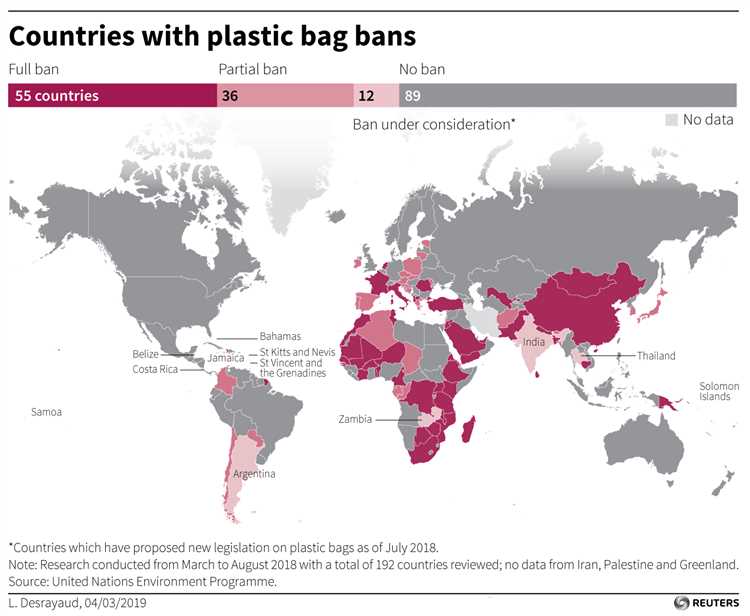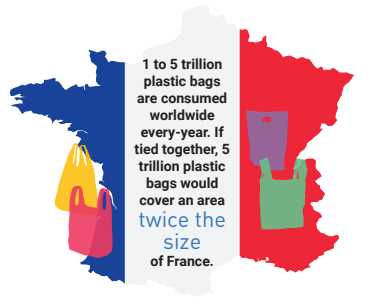In today’s world, where environmental awareness is on the rise, many countries have taken the initiative to ban plastic bags. These thin, flexible bags made from non-biodegradable materials have been a major contributor to pollution and have posed significant threats to the ecosystem. From marine life being harmed due to plastic ingestion to clogging sewer systems, the detrimental effects of plastic bags are undeniable.
One of the countries that has taken a strong stance against these harmful bags is Rwanda. Known as the cleanest country in Africa, Rwanda introduced a total ban on plastic bags in 2008. The government’s commitment to preserving the environment has resulted in a significant reduction in pollution and a cleaner landscape. The ban includes the manufacturing, use, and importation of plastic bags, making it a crime to possess or distribute them. As a result, Rwanda has become a shining example of how a small country can make a big impact.
Another country that has successfully implemented a ban on plastic bags is Kenya. In 2017, the Kenyan government banned the production, sale, and use of plastic bags in an effort to combat the country’s plastic pollution problem. The ban carries heavy penalties, including fines and imprisonment for those found in violation. Since the ban was implemented, Kenyans have adapted to alternative eco-friendly options, such as reusable bags and paper bags, in order to protect their fragile ecosystems.
Other countries that have joined the fight against plastic bags include Bangladesh, Morocco, and Italy. Each of these nations has implemented its own regulations and penalties to discourage the use of plastic bags. By doing so, they are not only protecting their own environments but also setting an example for the rest of the world to follow.
In conclusion, the ban on plastic bags is a crucial step towards a cleaner and more sustainable future. Countries like Rwanda, Kenya, Bangladesh, Morocco, and Italy have taken the lead in implementing strict regulations and penalties to curb the usage of plastic bags. It is through such global efforts that we can hope to reduce plastic waste, preserve our ecosystems, and create a healthier planet for generations to come.
- Overview of Plastic Bag Bans
- Current Status of Plastic Bag Bans Worldwide
- Environmental Impact of Plastic Bags
- 1. Wildlife Impact
- 2. Soil and Water Contamination
- 3. Economic Impact
- Benefits of Plastic Bag Bans
- Question-answer:
- Which country has banned plastic bags?
- When did the ban on plastic bags in Kenya take place?
- Why did Kenya ban plastic bags?
- What is the penalty for using plastic bags in Kenya?
- Are there any other countries that have banned plastic bags?
Overview of Plastic Bag Bans
The issue of plastic bag pollution has become a major concern worldwide. In an effort to reduce the environmental impact of single-use plastic bags, several countries have implemented strict bans on their use.
Plastic bag bans aim to encourage the use of reusable alternatives such as cloth bags, paper bags, or biodegradable options. By discouraging the use of plastic bags, these bans help minimize plastic waste, reduce litter, and protect wildlife.
Many countries have taken a proactive approach to tackle this issue. Some nations, like Rwanda and Bangladesh, were among the first to ban plastic bags over a decade ago. Others, including Kenya, have implemented some of the strictest bans, with penalties for both using and manufacturing plastic bags.
Plastic bag bans vary widely in terms of their scope and enforcement. Some countries have implemented partial bans, limiting the use of plastic bags for specific purposes, such as grocery shopping or retail. Others have adopted complete bans that apply to all types of businesses.
While plastic bag bans are an important step towards reducing plastic waste, they are not without challenges. Some critics argue that bans can lead to an increase in the use of alternative materials, which may have their own environmental drawbacks. Additionally, the effectiveness of bans may depend on public awareness and compliance.
Overall, plastic bag bans are an important tool in the global effort to combat plastic pollution. They are just one part of a larger strategy that includes recycling, waste reduction, and promoting sustainable alternatives. By implementing and supporting these bans, countries can make a significant impact in protecting our planet for future generations.
Current Status of Plastic Bag Bans Worldwide
Plastic bag bans have gained momentum in recent years as countries recognize the need to reduce plastic waste and its impact on the environment. Many countries have implemented measures to restrict or ban the use of single-use plastic bags, while others are in the process of developing legislation to do so. Here is an overview of the current status of plastic bag bans worldwide:
Implemented Bans:
1. Rwanda: Rwanda implemented a complete ban on plastic bags in 2008 and is considered one of the most successful examples of a plastic bag ban. The country has seen a significant decrease in plastic waste and has become a leader in sustainable practices.
2. Kenya: In 2017, Kenya introduced one of the world’s toughest plastic bag bans. The country imposed a fine of up to $38,000 or a maximum jail term of four years for the production, sale, or use of plastic bags. The ban has been effective in reducing the use of plastic bags in the country.
3. Morocco: Morocco banned the production, importation, sale, and distribution of plastic bags in 2016. The ban exempted certain types of plastic bags, such as those used for primary packaging of pharmaceutical products and primary agricultural products.
4. France: France implemented a ban on single-use plastic bags in 2016. The ban applies to both lightweight plastic bags and thicker plastic bags used for packaging fruits and vegetables. The country has also introduced a progressive tax on plastic packaging.
Planned or Proposed Bans:
1. Australia: Several states in Australia have implemented plastic bag bans, including South Australia, Tasmania, and the Australian Capital Territory. Other states are considering similar measures to reduce plastic waste.
2. United Kingdom: In 2015, England introduced a 5p charge for single-use plastic bags, which has resulted in a significant reduction in their use. In January 2021, the charge increased to 10p. Scotland, Wales, and Northern Ireland also have their own regulations regarding plastic bags.
3. Canada: Many cities in Canada have implemented plastic bag bans, including Montreal, Victoria, and Vancouver. The government of Canada is also considering a nationwide ban on single-use plastics, which would include plastic bags.
4. United States: While there is no nationwide ban on plastic bags in the United States, several states and municipalities have implemented their own measures. California, Connecticut, Hawaii, Maine, New York, and Vermont have banned single-use plastic bags, while others have imposed fees or taxes on their use.
The global movement to ban plastic bags continues to grow as more countries recognize the importance of reducing plastic waste. As the awareness of the environmental impact of plastic bags increases, it is likely that more countries will implement restrictions or bans to protect the planet for future generations.
Environmental Impact of Plastic Bags
Plastic bags have had a significant negative impact on the environment. They are one of the most common forms of litter and often end up in landfills, rivers, and oceans where they can take hundreds of years to decompose.
The production of plastic bags also contributes to pollution and greenhouse gas emissions. The manufacturing process requires the use of fossil fuels, such as petroleum and natural gas, which are non-renewable resources. Furthermore, the production of plastic bags releases toxic chemicals into the air and water, contributing to air and water pollution.
1. Wildlife Impact

Plastic bags pose a major threat to wildlife, particularly marine animals. Many animals mistake plastic bags for food and ingest them, leading to injury or death. Sea turtles, for example, commonly mistake floating plastic bags for jellyfish, one of their main food sources. When ingested, plastic bags can block their digestive system, causing starvation and eventual death.
In addition to ingestion, animals can also become entangled in plastic bags, leading to suffocation, injury, or drowning. This is particularly true for birds and marine mammals, which may mistake plastic bags for prey or get entangled in them while swimming.
2. Soil and Water Contamination

When plastic bags end up in landfills, they can release harmful chemicals into the soil and water. These chemicals can contaminate groundwater and have long-lasting effects on ecosystems. Plastic bags also prevent water from infiltrating the soil, leading to increased runoff and soil erosion.
Furthermore, plastic bags that make their way into water bodies can release microplastics as they degrade. These microplastics can then be ingested by aquatic organisms, entering the food chain and eventually affecting human health.
3. Economic Impact
The environmental impact of plastic bags also has economic consequences. Cleanup and disposal of plastic bag waste require significant resources and financial investments. Additionally, plastic bags can clog drainage systems, leading to flooding and costly infrastructure damage.
Plastic bag bans and regulations have been implemented in many countries and cities around the world to address these environmental and economic concerns. By reducing the use of plastic bags, we can mitigate their negative impact and work towards a more sustainable future.
Benefits of Plastic Bag Bans
Plastic bag bans have several benefits for the environment and society. One of the main advantages is the reduction in plastic waste. Plastic bags are non-biodegradable and can take hundreds of years to decompose. By banning plastic bags, countries can significantly reduce the amount of plastic waste that ends up in landfills or pollutes the oceans.
Another benefit of plastic bag bans is the positive impact on wildlife. Many animals mistake plastic bags for food and can suffer from ingestion or entanglement, leading to injury or death. By eliminating plastic bags, governments can help protect animals and preserve biodiversity.
In addition to the environmental benefits, plastic bag bans can also generate economic opportunities. By promoting the use of reusable bags, countries can stimulate the manufacturing industry and create jobs. This shift towards sustainable alternatives can also encourage innovation and the development of new, eco-friendly materials for bag production.
Furthermore, plastic bag bans can help raise awareness about the importance of reducing plastic consumption and promoting sustainable habits. By implementing these bans, governments send a strong message to citizens and businesses that plastic pollution needs to be addressed. This awareness can lead to a change in behavior and a societal shift towards a more sustainable future.
Overall, plastic bag bans have numerous benefits for the environment, wildlife, economy, and society as a whole. These bans not only reduce plastic waste but also protect animals, stimulate economic growth, and promote sustainable living. By implementing and supporting plastic bag bans, countries can take an important step towards a cleaner and healthier planet.
Question-answer:
Which country has banned plastic bags?
Kenya has banned plastic bags since 2017.
When did the ban on plastic bags in Kenya take place?
The ban on plastic bags in Kenya took place in 2017.
Why did Kenya ban plastic bags?
Kenya banned plastic bags to reduce environmental pollution and protect wildlife.
What is the penalty for using plastic bags in Kenya?
The penalty for using plastic bags in Kenya is a fine of up to $38,000 or imprisonment for up to four years.
Are there any other countries that have banned plastic bags?
Yes, several other countries have also banned plastic bags, including Rwanda, Bangladesh, and Morocco.